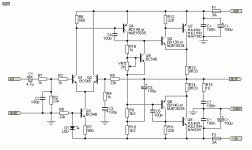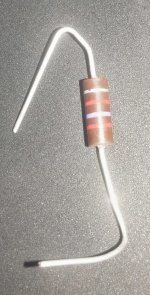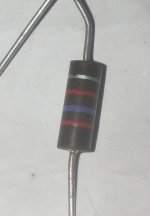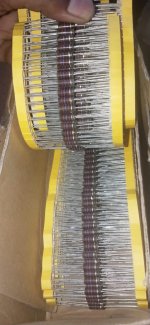I've noticed most amp build kits come equipped with carbon composition resistors, you know, the brown base color tubular resistors with hard edged ends. I have two Fender amps from the 60s that use such and not a single resistor in them hasn't drifted 20% high or more in value. I realize the circuits are forgiving and even a 150k in the plate rather than a 100k is going to work, but I just can't bring myself to use carbon comps in a new build.
Do you know something about recent issue carbon comps that I don't know?
Do you know something about recent issue carbon comps that I don't know?
I would not even say "most amp build kits" supply CC; even if we limit to "tube gutiar amps". Is that really true? I have not done a rigorous count/survey but I see a lot of carbon film.
If I'm not mistaken, carbon composition resistors are better at handling temporary overloads than carbon film and metal film. They also have much more 1/f noise. No idea why anyone would want to use them in a new build, except maybe at places where large temporary overloads are to be expected.
It'S just an acquired taste, I think. Guitar players love the sound of their old gear as it presents itself now, as the result of all the deviations in resistor values etc. And the folks don't know how their amps sounded when they were new. So they're not familiar with the sound of an amplifier with new conponents and simply prefer what they know. Hence they believe that amplifiers have to contain composition resistors for good sound.
Best regards!
Best regards!
If anything, my preference is metal film for input stages, where I want minimum noise. Carbon film is okay especially once the signal has been amplified to where the resistors doesn't contribute as much noise..but if you don't mind spending more go metal film.
If I'm not mistaken, carbon composition resistors are better at handling temporary overloads than carbon film and metal film. They also have much more 1/f noise. No idea why anyone would want to use them in a new build, except maybe at places where large temporary overloads are to be expected.
The problem with a resistor withstanding a large temporary overload is that some more expensive component is then likely to fail, or overheat. Having the resistor act like a fuse is perhaps the cheaper failure mode.
Carbon film resistors typically get a lower resistance when they are massively overloaded, wirewound resistors typically go open circuit, I don't know about other types. In any case, you need a special fusible resistor if you want to be sure it goes open circuit.
Recently I happened to find some Carbon comp resistors 1/2W rated, I wanted to use them in P3A amplifier circuit from Rod Elliott
Here is the schematic of P3A, R9 and R10 ( which are part of bootstrap)are the resistors I have questions about, will there be any problem with using these resistors,like noise and stability.



Here is the schematic of P3A, R9 and R10 ( which are part of bootstrap)are the resistors I have questions about, will there be any problem with using these resistors,like noise and stability.



Pretty much these days, yes.
I mean, you could use them, but modern resistors would be better and are cheap.
I mean, you could use them, but modern resistors would be better and are cheap.
There are ceramic composition resistors on Mouser now which could replace carbon comp if you want something closer to carbon comp but more stable. Expensive though.
$0.005 each. You can get brand new metal film for as low as £0.0024 from Farnell which is close enough the same price ( I think only 0.25W though )
£0.0162 thats the mini ,not the £0.0024.
and i have to buy mini 2k plus tax and shipping extar ,so way much more than here in offline
and i have to buy mini 2k plus tax and shipping extar ,so way much more than here in offline
If I'm not mistaken, carbon composition resistors are better at handling temporary overloads than carbon film and metal film. They also have much more 1/f noise. No idea why anyone would want to use them in a new build, except maybe at places where large temporary overloads are to be expected.
Yes. Carbon composition (or ceramic substitutes) have a higher pulse rating. Used in eg high voltage power supplies where excessive voltage / current may be experienced eg when an arc occurs. fwiw there are major supply chain issues with CC resistors atm with various sources withdrawing production.
Hello.
I have looked at Mouser lately and they are running low on their carbon composition resistor stock.
Plus, they identify their label limited range of products as 'end of life'.
Bought plenty of carbon composition resistors from Mouser these last years (Kayama, Ohmite and others), since I prefer to use them in signal paths in tube amps (please folks don't start-it's a hobby).
But lately it seems that sources are drying-up fast.
And likely it'll be harder and harder to come by as new items in the near future.
They were getting expensive lately compared to other types, but still affordable.
If manufacturers like Kayama, Ohmite and TE Connectivity phase them out, will they go extinct?
Apart from Mouser everywhere else they go for much higher prices and are mostly NOS/used.
Did a quick search and noticed there is still a manufacturer (in China) that list them it their products - JDC Resistors (never heard of them before).
However, never seen them on sale and it seems they are impossible to get online.
By the way, are these ceramic composition resistors anything like the classic carbon comps?
They seems to replace them in their application, but are they of similar construction?
Do they employ carbon as conductive medium in their mysterious ceramic composition?
I have looked at Mouser lately and they are running low on their carbon composition resistor stock.
Plus, they identify their label limited range of products as 'end of life'.
Bought plenty of carbon composition resistors from Mouser these last years (Kayama, Ohmite and others), since I prefer to use them in signal paths in tube amps (please folks don't start-it's a hobby).
But lately it seems that sources are drying-up fast.
And likely it'll be harder and harder to come by as new items in the near future.
They were getting expensive lately compared to other types, but still affordable.
If manufacturers like Kayama, Ohmite and TE Connectivity phase them out, will they go extinct?
Apart from Mouser everywhere else they go for much higher prices and are mostly NOS/used.
Did a quick search and noticed there is still a manufacturer (in China) that list them it their products - JDC Resistors (never heard of them before).
However, never seen them on sale and it seems they are impossible to get online.
By the way, are these ceramic composition resistors anything like the classic carbon comps?
They seems to replace them in their application, but are they of similar construction?
Do they employ carbon as conductive medium in their mysterious ceramic composition?
Carbon comps has been the lowest quality resistor to build with. They are only used in tube gear because back then there were no choices for high voltage resistors.I have looked at Mouser lately and they are running low on their carbon composition resistor stock.
For that tone after hiss subtraction, the more safer ones are carbon film. They don't catch on fire. That is why all those have gone to surplus.
I use different ones and in combinations too. But my favorite in the cathode circuit is these type: https://mou.sr/48o5cED
- Home
- Live Sound
- Instruments and Amps
- Carbon composition resistors

